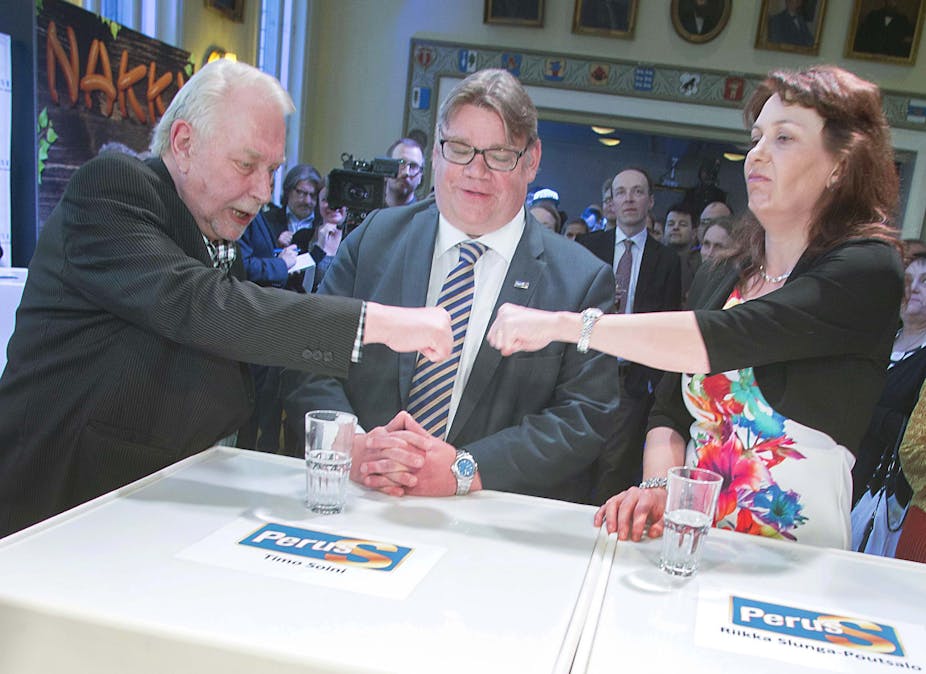A right wing anti-EU party has enjoyed success in Finland’s election that saw the governing National Coalition suffer a dramatic defeat. After a campaign dominated by domestic issues, the opposition Centre party won 49 seats of the 200 up for election, while the anti-EU Finns Party won 38 and the governing National Coalition won 37.
As a party of the populist right, the Finns latches on to voter discontent wherever it can be found. It did so spectacularly in the 2011 elections, where the party (previously known as the True Finns) expanded its vote share by an historic 14.9% vote share – the largest increase in parliamentary history.
That success was largely attributed to the Finns’ unashamedly anti-European integration platform, which distinguished them from all other major political parties in Finland. At the time, Eurozone bailouts were a critical issue in Finnish politics, and the bailout-seeking member-states were widely disparaged as fiscally irresponsible and reckless.
The previous Finnish government drove a hard bargain at the EU bailout negotiations, insisting for example that an Irish bailout be accompanied by strict Irish financial policy reform. Finland’s European Commissioner at the time, Olli Rehn, was responsible for Economic and Monetary Affairs, and also proved a strict financial disciplinarian, earning the monicker “Rehn of Terror” among the bailout-seeking states.
The Finns Party, however, promised an even tougher stance, and stood against devolving more financial authority from Helsinki to Brussels and the European Central Bank in Frankfurt.
With its success in 2011, the Finns Party was well placed to enter the governing coalition, but leader Timo Soini preferred to remain in opposition. Joining the government could have underminded its dissenter appeal, and Soini rejected the idea that The Finns Party could join a coalition government that was willing to bailout Eurozone economies.
This time around, though, Soini appears to have had a change of heart.
He has clearly indicated his desire for The Finns to join a government, even though this would mean working with parties that voted for the bailouts. Soini is confident a compromise can be reached, but the risk of diluting his party’s key anti-European integration measure may cost it further electoral success.
The Finns Party is also not the most appealing coalition partner, particularly for parties on the social left. Some of its MPs have expressed deeply controversial opinions about Muslim migrants, which attracted widespread condemnation. The party’s former Chairman of the Administrative Committee, Jussi Halla-Aho, was found guilty of ethnic agitation by the Finnish Supreme Court in 2012.
End of an era
From 2003 to 2011, the Centre party held power in Finland. Now, it appears it has regained its leading position. It is now headed by Juha Sipilä, a first-term MP from the northern city of Oulu, with a background as CEO of several IT companies. Sipilä’s hometown epitomises the changing fortunes of Finland’s economy: Oulu once boomed during the high days of Nokia and the pulp industry, when Sipilä made his fortune, but has suffered high unemployment since the recession.

Most of all, this was a terrible night for the fiscally conservative National Coalition party, which has been in power since 2011.
The National Coalition first governed under the leadership of Jyrki Katainen, who headed a broad six-party coalition that promised reform to the state’s pensions, healthcare and social support structures and tighter control on government spending (leading to numerous puns on the Prime Minister’s surname, which is similar to kätäinen, the Finnish word for “cash”).
Two parties, the Left Alliance and the Greens, went on to leave the government, as did Katainen, who headed to Brussels to become a European Commissioner in 2014. His successor was Alexander Stubb, the former foreign minister.
Educated in the US, Belgium and the UK, a prolific Tweeter and marathon enthusiastic, Stubb is a more international and charismatic figure than the Finnish electorate is probably used to. This never translated into broad appeal, and the consensus is that Stubb was better suited to the more social and public relations aspects of politics than the less-glamorous work of hammering out consensus on domestic issues.
Sipilä has to some extent used the government’s failing on social spending reform to his advantage. In an interview with the Helsingin Sanomat, he took some responsibility for this on behalf of his party, noting that previous Centre Party-led governments also failed to act on this issue.
Still, Sipilä acknowledges that social spending reform is a divisive issue, and now he has won the election, he will likely have to pilot reforms through other coalition partners. The goal, he told the Helsingin Sanomat, “is to do less but to get it done.” For Finland in 2015, this may appear the best anyone can hope for.

